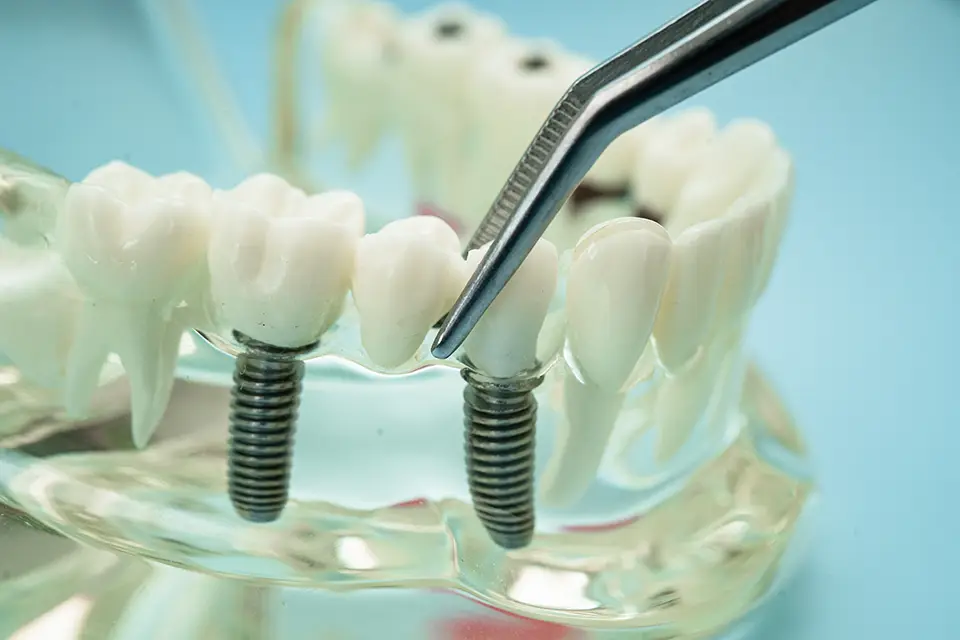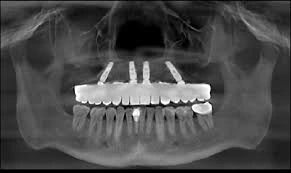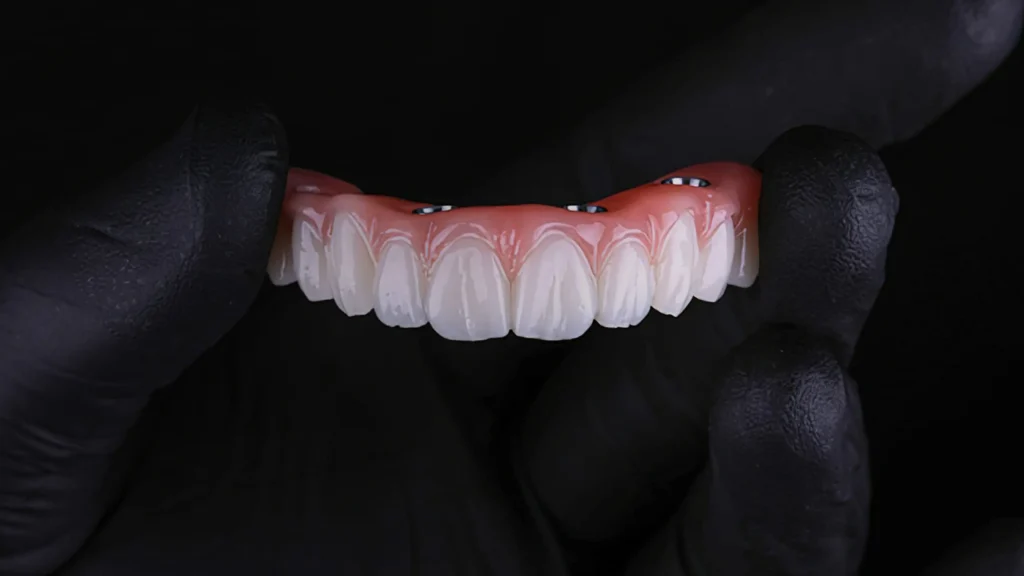When you lose a tooth or more, you might wonder about the best solutions to restore your smile and chewing confidence. Dental implants, particularly titanium dental implants, are one such solution, having been the cornerstone of this field for decades.
Prof Clinic today provides you with everything you need to know about Titanium dental implants: their features, advantages and disadvantages, costs, and how they compare to ceramic dental implants. So, let’s dive into our article.
What are Titanium Dental Implants?
A Titanium tooth is a metal implant made of Titanium, surgically placed into the jawbone to serve as a replacement for the root of your missing tooth. This implant fuses strongly with the surrounding bone through a process called osseointegration, providing a solid and stable foundation for the artificial tooth mounted on top.
Properties of Titanium Dental Implants
The leading position of Titanium teeth is attributed to a set of properties that make them the ideal material for replacing tooth roots. The most notable of these properties are:
Biocompatibility
Titanium is renowned for its exceptional ability to integrate with bodily tissues without causing allergic or inflammatory reactions in the vast majority of patients. This biological acceptance paves the way for a safe implantation process within the jawbone and surrounding gingival tissues.
Osseointegration Property
This is a unique ability of titanium to form a direct and strong bond with the surrounding bone tissue, creating a structurally and functionally robust connection. This bond provides the dental implant with stability and firmness comparable to that of natural tooth roots.
Strength and Durability
Thanks to its superior strength, which rivals that of natural tooth roots, and its resistance to corrosion, titanium implants can withstand the immense chewing forces your teeth endure daily without being compromised. This durability ensures a long lifespan for the implant.
High Corrosion Resistance
When exposed to fluids, titanium forms a protective surface oxide layer that makes it highly resistant to corrosion and degradation in the moist and complex environment of the mouth. This property maintains the implant’s integrity and biological stability over many years.
To restore the strength and beauty of your smile through titanium dental implants, you can rely on Pro Clinic, where our team of expert dentists provides the best solutions tailored to your needs.
Also Read: Different Types of Dental Implants: Which is Best?
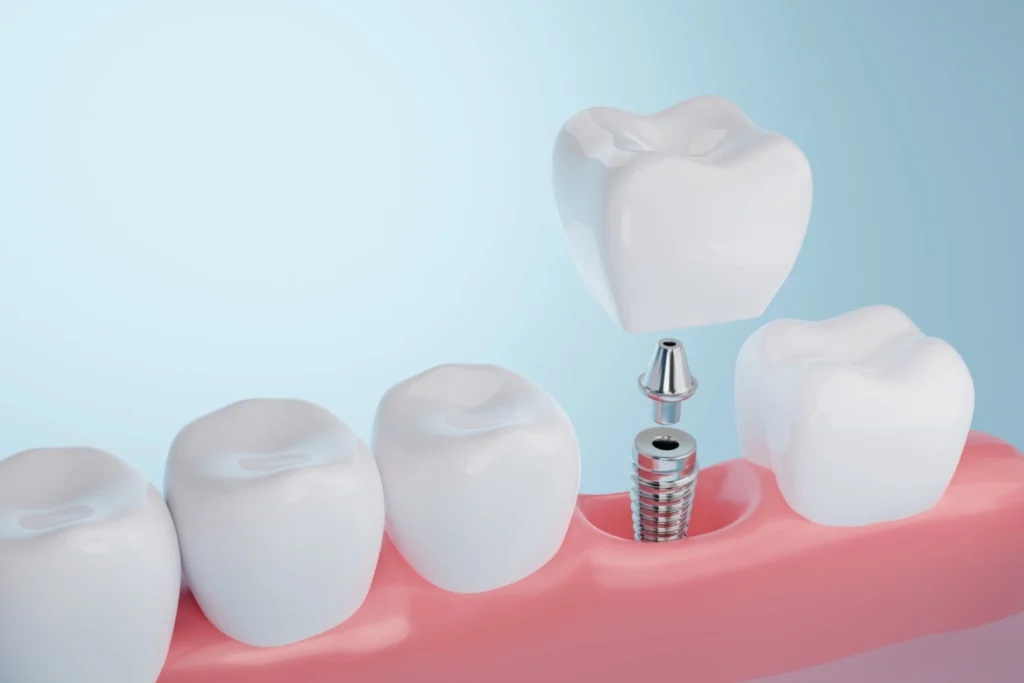
Pros & Cons of Titanium Dental Implants
No medical procedure is entirely free of advantages or drawbacks, and Titanium dental implants, despite their overwhelming success, have their own merits and limitations. Let’s explore both.
Pros of Titanium Dental Implants
- High Success Rates: Titanium implants boast an impressive clinical success record, with success rates often exceeding 95% in many cases, making them a reliable solution for restoring your teeth’s functionality.
- Jawbone Loss Prevention: Unlike other alternatives that don’t stimulate the bone, titanium implants act as a root that encourages the surrounding jawbone, preventing bone shrinkage and deterioration, which typically occurs after tooth loss.
- No Impact on Adjacent Teeth: Unlike traditional bridges that require grinding down neighboring teeth for support, titanium implants are standalone and do not rely on other teeth, thus preserving the structure and integrity of your remaining natural teeth.
- Improved Speech and Enhanced Confidence: Titanium implants provide absolute stability, eliminating the worry of slipping dentures. This grants you clear speech, strong chewing ability, and full confidence in a smile that looks completely natural.
- Versatility: Titanium implants can replace a single missing tooth, multiple missing teeth, or even support a full denture. Their flexibility makes them suitable for a wide range of clinical cases.
Cons of Titanium Dental Implants
- Surgical Procedure Risks: Like any surgical procedure, dental implant placement carries some potential, though rare, risks, such as infection at the implant site, damage to nearby nerves, or sinus issues when implants are placed in the upper back jaw.
- Potential for Grayish Hue: In rare cases, particularly in individuals with thin gums, the gray color of the titanium metal may show at the gumline, which can affect the aesthetics of the front mouth area.
- Healing and Osseointegration Period: The osseointegration process requires several months for the implant to fully bond with the bone before the final tooth is placed, meaning the treatment is not immediate and requires patience.
- Risk of Peri-Implantitis: Despite their resilience, implants and surrounding gums may develop inflammation (peri-implantitis) if oral hygiene is neglected, requiring specialized treatment to preserve the implant.
- Initial Cost: Titanium implants have a higher upfront cost compared to some other dental alternatives. However, their durability and longevity make them a more cost-effective choice in the long run.
To overcome these challenges and achieve your dream smile with titanium implants, start your journey now with Pro Clinic. Contact our team and get a free consultation today.
Also read: All-on-4 Dental Implants in Turkey: Cost & Advantages
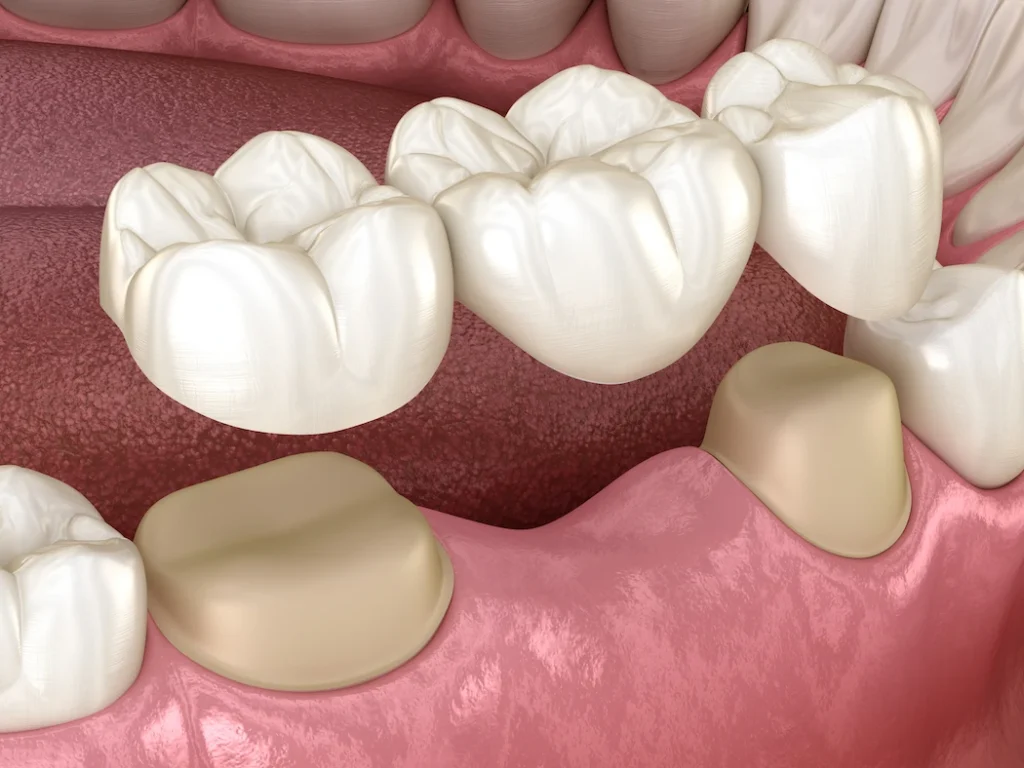
How Much do Titanium Implants Cost?
The price of titanium dental implants varies depending on the location, the brand of the implant, and the complexity of the case. In the USA, for example, the estimated titanium teeth cost for a single titanium implant, including the implant, abutment, and crown, typically ranges between $3,100 and $5,800 USD.
In Europe (Germany or the United Kingdom), the titanium screw implant cost starts from $864 to $1,620 USD, and with the crown, it may reach $2,700 to $4,320 USD per tooth, depending on the quality of materials and the dentist’s expertise.
Titanium Implants Cost in Turkey
Titanium dental implants in Turkey are an economical and appealing option for many compared to European countries and the United States. The approximate titanium teeth cost for a single tooth in Turkey generally ranges between $432 and $1,080 USD.
Within this range, specialized centers like Prof Clinic offer titanium screw implant services, with prices starting at $540 USD and going up to $810 USD, confirming their competitive pricing.
Also read: The Costs of Full Mouth Dental Implants
Titanium Dental Implants Vs. Ceramic Dental Implants
With advancements in dental implants, Titanium is no longer the sole option, as ceramic implants, particularly Zirconia, have emerged as an alternative offering distinct advantages. Comparing these two types helps determine the most suitable choice based on the patient’s needs and the dentist’s preferences. So, what’s the difference between them?
- Material and Biocompatibility: Titanium dental implants are made from high-purity titanium metal, renowned for its excellent biocompatibility with the body. In contrast, ceramic implants are crafted from white zirconia, a non-metallic material also highly biocompatible, making it ideal for those who prefer metal-free procedures or have rare sensitivities to titanium.
- Aesthetics and Appearance: Zirconia implants feature a natural white color that closely matches teeth and gums, making them an excellent aesthetic choice, especially in visible front jaw areas and for individuals with thin gums where the grayish hue of **titanium teeth** might show.
- Strength and Durability: Titanium has a long-standing record of withstanding immense chewing forces due to its high mechanical strength, making it highly resistant to fractures. Modern ceramic implants have become significantly stronger, but **titanium screw implants** remain more durable in certain complex clinical cases.
- Implant Design: Titanium implants typically come in a two-piece design (implant and separate abutment), offering greater flexibility in aligning and angling the artificial tooth. Zirconia implants, however, are usually a single-piece structure, which limits adjustment options but eliminates any potential micro-gaps between the implant and abutment.
- Osseointegration: Both materials have a proven ability to successfully integrate with the surrounding jawbone (osseointegration). Research indicates that integration rates for both types are comparable and effective in providing the necessary stability for the implant.
Discover the best option for your smile with **titanium dental implants** or ceramic implants at ProClinic, and book a free consultation today to determine the ideal treatment for you.
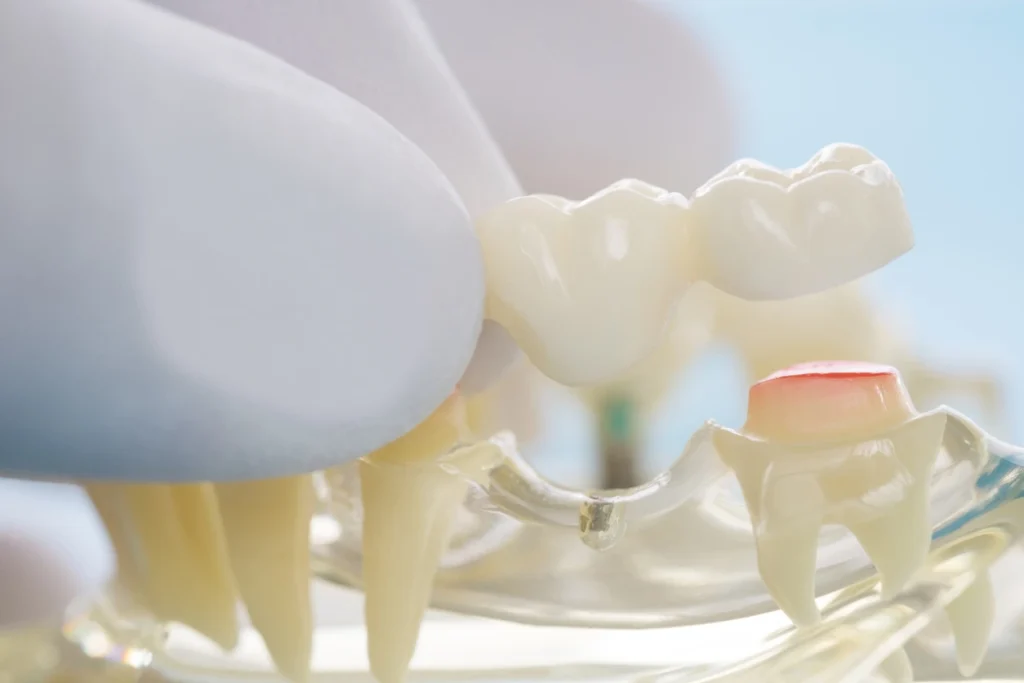
Prof Clinic is the Best Dental Implant Clinic in Turkey
With Turkey’s growing popularity as a destination for dental implants, Prof Clinic stands out as a leading center for those seeking a Titanium dental implant experience that meets global standards.
Our center combines specialized medical expertise, the use of cutting-edge diagnostic and treatment technologies, and a comfortable, supportive environment for patients. Our focus on achieving optimal functional and aesthetic outcomes makes us a trusted choice for restoring your smile and confidence.
FAQs about Titanium Dental Implants
Is titanium good for dental implants?
Yes, Titanium metal is the most widely used and proven material for titanium dental implants, thanks to its excellent biocompatibility and unique ability to integrate closely with the jawbone (osseointegration). It provides a strong and durable foundation for replacement teeth.
What are the disadvantages of titanium implants?
Potential disadvantages include the appearance of a grayish hue through thin gums in some aesthetic cases, a very rare possibility of metal sensitivity, and general risks associated with any surgical procedure, such as infection or wound healing issues.
How long do titanium dental implants last?
With proper Titanium dental care, oral and regular follow-ups, Titanium teeth for human can last for decades, and in many cases, a lifetime. Their lifespan largely depends on overall oral health and the patient’s adherence to care instructions.
What is the cost of titanium dental implants?
The titanium dental implant cost varies based on factors such as the clinic’s location, the surgeon’s expertise, and the patient’s individual condition. However, they are considered a long-term investment due to their durability and longevity compared to less durable alternatives.
Which implant is better, titanium or zirconia?
Both types are effective with high success rates in bone integration, and the choice depends on the individual case, patient preferences, and the dentist’s recommendation. Titanium screw implants have a longer clinical track record and high durability, while zirconia offers better aesthetics in some cases and a metal-free option.
What is the healthiest dental implant?
In terms of health and biocompatibility, both titanium and zirconia are excellent and medically approved options. Titanium is highly biocompatible with a long history of safe use, while zirconia is metal-free and may be preferred by those seeking a completely metal-free treatment approach.
Are ceramic implants better than titanium?
It’s not possible to definitively say one is better than the other, as each has advantages and disadvantages that make it suitable for specific cases. Ceramic excels aesthetically and for patients preferring non-metallic materials, while titanium teeth have a longer success record and potentially greater strength in certain situations.
How to fix missing teeth without implants?
- Dental bridges: Fixed option using adjacent teeth for support.
- Partial dentures: Removable solution for one or more missing teeth.
- Full dentures: For complete tooth loss, especially in one or both arches.
How many teeth can you replace with implants?
You can replace:
- 1 tooth with 1 implant + crown
- Multiple teeth with 2–4 implants + bridge
- All teeth with 4–6 implants per arch (All-on-4/6 system)
Implants don’t need to match tooth-for-tooth; a few well-placed implants can support many teeth.
How many trips to Turkey for dental implants?
Typically 2 trips:
- Trip 1: Implant placement (3–5 days)
- Trip 2 (after 3–6 months): Abutment and permanent crown/bridge fitting (5–7 days)
Resources

